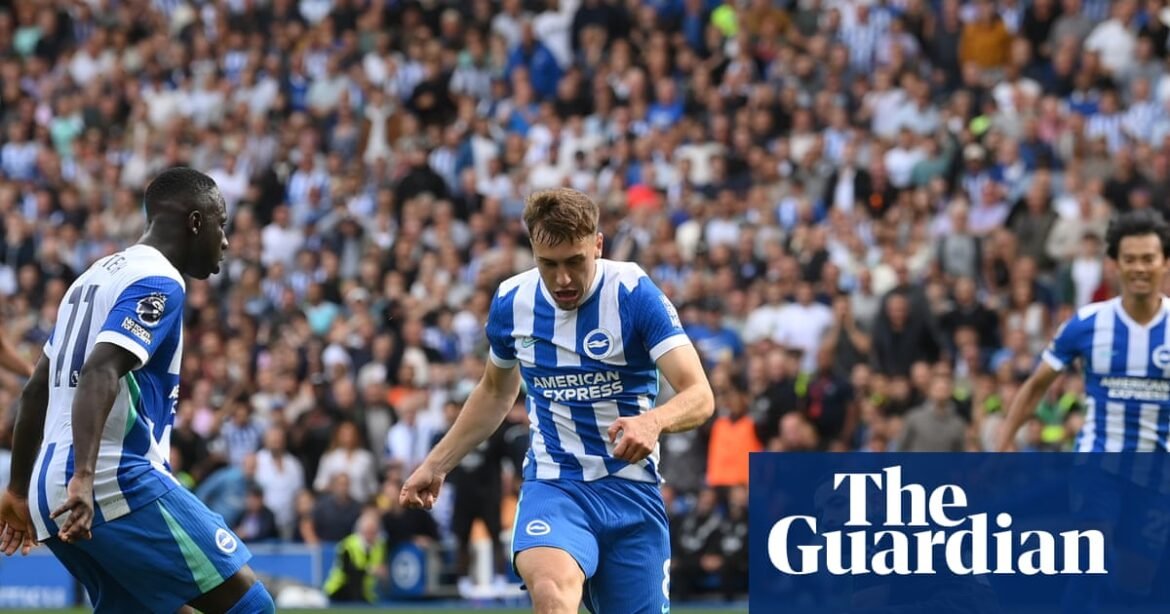When a team loses the aura of champions, it can go absolutely.
Opponents suddenly look at them and wonder what on earth once seemed so intimidating, how on earth a bunch of players in these shirts, could seem so unbeatable. At half-time, Manchester City led, and seemed comfortable in their lead against opponents who had never got going. By the time Brajan Gruda calmly rounded James Trafford and dumped Rayan Aït-Nouri on his backside before rolling into an empty net, a Brighton winner had come to seem almost overdue.
Seconds earlier Trafford had made a remarkable save, stretching back and to his left to claw away a deflected Jan Paul van Hecke shot.
Fabian Hürzeler, the Brighton manager, must take credit for a quadruple substitution on the hour that transformed the game, but just as striking was how vulnerable City became to balls played in behind their defensive line. The structure that once gave them a stifling control has vanished almost entirely.
The sense for Brighton had been of performances having been rather better than results. Although they conceded an injury-time equaliser at home against Fulham and then lost at Everton, where they missed a penalty and twice hit the woodwork, they have won the xG convincingly in both games. While Brighton beat City at home last season, it was always likely that this would be a trickier afternoon – and yet Tottenham had shown last week how this City can been pressured, something Brighton never managed in the first hour.
Indeed in the first half, they were undermined by a lack of precision and decisiveness, a laxity that frustrated home fans. A pass completion rate of under 75% before half-time told its own story. City weren’t at anything like their fluent best, which is perhaps no real surprise given the number of players they are trying to integrate, and the disruption to their pre-season caused by participation on the Club World Cup. Even the return of Rodri for his first Premier League start since he damaged his knee against Arsenal last September couldn’t provide a sense of the old calm.
Although there were some signs of at least some of the familiar City rhythm returning, this remains a side more dependent on individuals for attacking penetration than the stereotype of a Pep Guardiola side.
Erling Haaland, as ever, was the major threat. After scuffing one early chance, he had dragged another effort just wide and then headed straight at Bart Verbruggen from close range when, presented with an opportunity following Omar Marmoush’s run, he dinked the ball neatly over the goalkeeper. Brighton, perhaps, will feel they should have cleared, Marmoush somehow bundling through a challenge from Van Hecke before dabbing a pass between Lewis Dunk’s legs.
after newsletter promotion
But perhaps because of that individualism, City are vulnerable to counterattacks, in the way that Guardiola teams playing below their best often are. Long before Gruda’s winner, Trafford had had to make good saves to keep out Kauro Mitoma in the first half and Yakuba Minteh in the second, while Diego Gómez squandered a similar opportunity by manhandling Abdukodir Khusanov.
Minteh’s chance, in particular, seemed to unsettle City and it was soon after that, after the needless concession of a free-kick on the right by Khusanov, Dunk’s volley smacked into Matheus Nunes’s upraised arm. James Milner, six years after he last scored a penalty, converted against his former club to become the second oldest (behind Teddy Sheringham), as well as the second youngest (behind James Vaughan), scorer in Premier League history.
What was baffling then was just how incapable City seemed of stopping the Brighton flow. Trafford made save after save before, in the 89th minute, another turnover led to a four on three break. Mitoma picked his pass with typical composure and Gruda, presented with yet another one-on-one, almost casually converted and City, somehow, had lost a game they seemed to have under control with half an hour to go.

